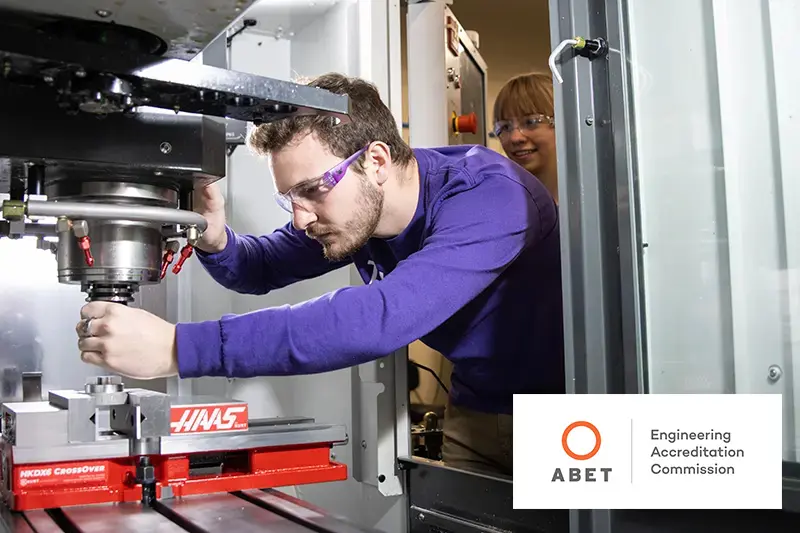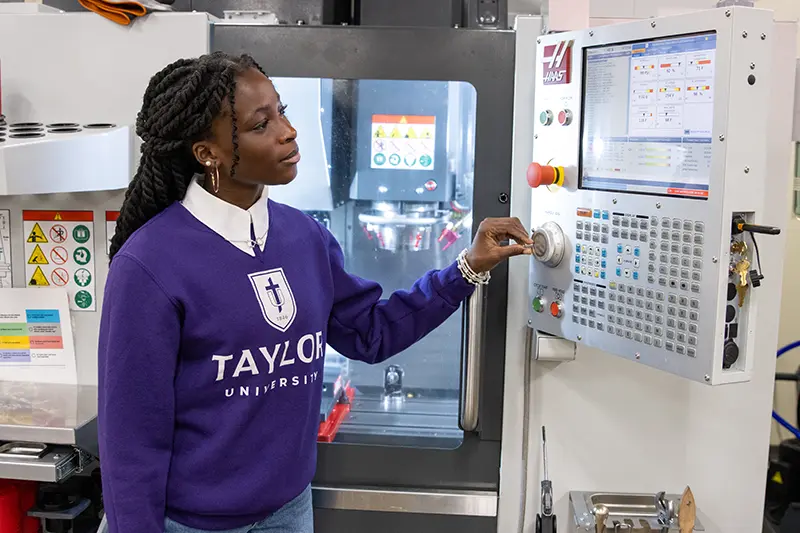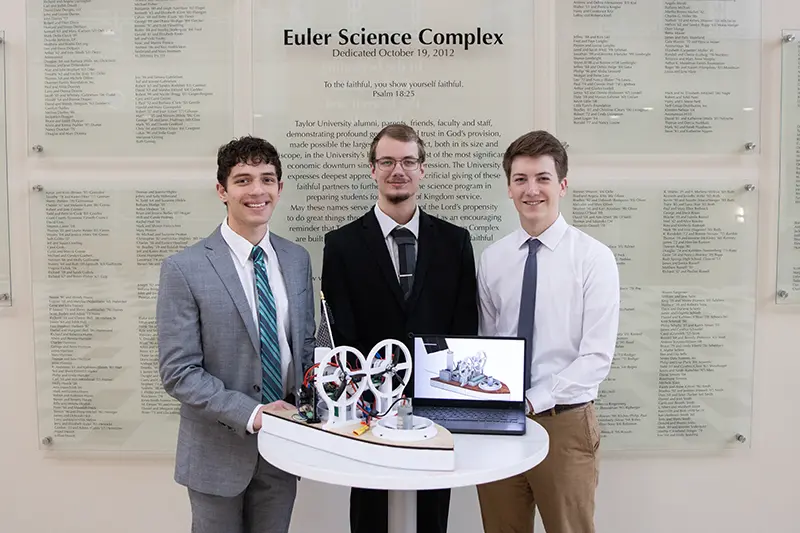-
-
- Financial Aid
- Financial Aid
- Scholarships
- Loans
- Grants
- Federal Work Study
- Additional Resources
-

Taylor University’s Bachelor of Science in Mechanical Engineering has recently been accredited by the Engineering Accreditation Commission (EAC) of ABET, a globally recognized accreditation agency for programs in natural science, computing, engineering, and engineering technology. ABET is an ISO 9001-certified quality assurance organization whose accreditation adds critical value to academic programs in the technical disciplines, where quality, precision and safety are of the utmost importance.
ABET accreditation assures that programs meet standards for graduates to successfully enter critical technical fields. The formal application process takes approximately 18 months to complete and can begin once the first cohort has graduated from the program of interest. The approval process is both student and academically focused and involves data collection, self-evaluation, and on-campus assessment from commission members to ensure program quality. Teams of highly skilled professionals from industry, academia, and government assess program curricula, faculty, facilities, and institutional support.
“Our goal is not just to have an accredited program. Our goal is to have a rigorous program that is continually improving and evolving with the latest technology,” said Dr. Danielle Nobles-Lookingbill, Department Chair and Assistant Professor of Engineering.
Within their criteria, ABET holds programs accountable to seven student outcomes, including producing safe solutions to complex problems, effective communication, and societal and ethical responsibility. Taylor adds an eighth item to this list—that students demonstrate Christian servant-leadership by practicing spiritual disciplines and redemptive service to the community. One of the ways students engage in global service is through the Engineering for Missions Kenya initiative.

Taylor has a history of ABET accreditation beginning in 2007 for Engineering (BS) with mechanical, electrical, physics, and general concentrations. Currently, Taylor’s Mechanical Engineering (BS), Engineering (BS), and Computer Engineering (BS) programs are all accredited by the EAC of ABET. ABET has retroactively accredited the Mechanical Engineering program to 2022, covering the University’s first BS in Mechanical Engineering graduates.
For students, the ABET accreditation of their program provides the foundational step to pursue their professional engineering licensure. After completing undergraduate studies, passing two national exams, and gaining field experience, Engineering graduates can apply for their professional engineering license. One criterion is to have graduated from an accredited program or prove that their program meets the standards for accreditation.
In addition to meeting professional standards, Taylor’s program size creates a rich learning environment with an ideal student-faculty ratio.
“Because of the size of our program and the high-caliber students Taylor attracts, we’re able to conduct in-depth research and development with our students,” shared Nobles-Lookingbill.

As freshmen, Taylor Engineering students are required to develop and design a unique product in teams of two, using Fusion360—a 3D computer-aided design (CAD) software—to model it. They project it onto an XY plane, cut out the parts in the University's Don Wood Foundation engineering machine shop, assemble it, and control motors with sensor feedback and Arduino hardware. With a systems approach, all Engineering freshmen collaborate and hone their skills, learning nuanced aspects of each field.
The academic rigor of the program only grows throughout the students’ years at Taylor. By senior year, students participate in research on par with many master’s programs. “This process starts as soon as our students begin at Taylor. They want to multiply their gifts like Jesus asks us to. As faculty, we really want students to excel, becoming equipped Christian leaders in engineering,” Nobles-Lookingbill stated.
Mechanical Engineering students’ senior capstone has recently focused on SkyForge, a robot designed to assemble massive structures while in orbit in outer space, such as interplanetary transports, space stations, or telescopes. Taylor students produced the core computation unit or “brain” of the robot, which will be integrated into a satellite scheduled to launch in the beginning of 2026. Once in orbit, the unit’s functionality will be tested in the harsh radiation environment.
Additionally, a nearly $2 million grant from the Don Wood Foundation has provided state-of-the-art, industry-forward machines and prototyping equipment, including 5-axis CNC mills and metal, composite, and flexible material 3D printers. This partnership has amplified Taylor’s capabilities and opportunities for students.
Taylor University is committed to equipping students and providing rigorous academic training. The Engineering program is continually expanding and developing mission-focused graduates for the Kingdom.